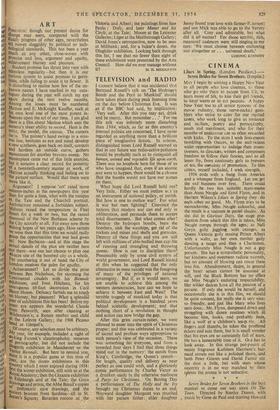TELEVISION and RADIO I CANNOT believe that it was accidental
that Bertrand Russell's talk on 'The Hydrogea Bomb and the Peril to Mankind' should have taken place during peak listening time on the day before Christmas Eve. It was as if the BBC had said, by implication: 'Very well. After this you may eat, drink and be merry. But remember ...' For me this talk was infinitely more disturbing than 1984, which, as far as this country's internal politics are concerned, I have never regarded as anything more than a brilliant piece of imaginative fiction. In solemn, distinguished tones Lord Russell warned us that in any future war radio-active pollution would be probably such as to atinguish all human, animal and vegetable life upon earth. There was no loophole here for those of us who have imagined that, even if an atomic war were to happen, there would be a chance that the bombs would not have our names on them.
What hope did Lord Russell hold out? Very little. Either we must outlaw w, r as an instrument of national policy, or perish. But how is one to outlaw war? For what is war but men fighting? Convince the nations that modern war can end only in obliteration, and persuade them to accept total disarmament. But what comes after? Destroy the hydrogen bombs, burn the bombers, sink the warships, get rid of the rockets and mines and shells and grenades.
• Destroy all these things and you are still left with millions of able-bodied men cap ible of running and strangling and throwing stones. How is one to discipline them? Presumably only by some civil system of world government, and Lord Russell hinted at this when he suggested that the only alternative to mass suicide was the foregoing of many of the privileges of national sovereignty. But if, as it would seem, we are unable to achieve this among the western democracies, how can we hope to achieve it between East and West? The terrible tragedy of mankind today is that political development is a hundred years behind scientific development; and that nothing short of a revolution in thought and action can now bridge the gap.
After this grim curtain-raiser, we were allowed to enter into the spirit of Christmas proper; and this was celebrated in a variety of sacred and profane ways appropriate to each person's view of' the occasion. There was something for everyone, and from a crowded four days I find that three things stand out in the memory : the carols from King's, Cambridge, the Queen's speech— for length, quality and delivery as near perfect as one could wish, and a gloriously comic performance by Charles Victor as a drunken uncle in the otherwise mediocre A Party fir Christmas. On Boxing Day a performance of The Holly and the Ivy brought my Christmas duties to an end. Wayward daughter Margaret was reunited with her parson father: elder daughter Jenny found true love with fariner.P, tersoti; and son Mick was able to go to the Varsity after all. Cosy and admirable, but what did it all matter? For those terrible, rich, measured cadences were still ringing in my ears: We must choose between outlawing war altogether or. . . universal death.' LUDOV1C KENNEDY


























 Previous page
Previous page